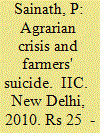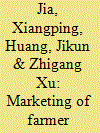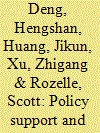|
|
|
Sort Order |
|
|
|
Items / Page
|
|
|
|
|
|
|
| Srl | Item |
| 1 |
ID:
100246


|
|
|
|
|
| Publication |
IIC, New Delhi, 2010.
|
| Description |
18p.
|
|
|
|
|
|
|
|
|
|
|
|
Copies: C:1/I:0,R:0,Q:0
Circulation
| Accession# | Call# | Current Location | Status | Policy | Location |
| 055466 | 630.92/SAI 055466 | Main | On Shelf | General | |
|
|
|
|
| 2 |
ID:
108827


|
|
|
|
|
| Publication |
2011.
|
| Summary/Abstract |
Governments are increasingly using satellite technologies to check for compliance with legislation, e.g. to verify that farmers are complying with environmental legislation on vegetation clearance in Australian states. As the detail of what can be seen by satellite technologies continues to improve and they are likely to become ever more attractive to those monitoring compliance with numerous different laws, it is important to consider the attitudes of those groups currently being monitored this way. Two surveys, the first of their kind internationally, were undertaken in the UK and Australia to assess attitudes in regulated communities (here farmers) where satellite monitoring was already being used. The aim was to understand attitudes to this method of monitoring, including its perceived benefits and drawbacks. Many of the farmers surveyed were either positive, or ambivalent, about satellite monitoring taking place. Only about a quarter of Australian farmers and a third of UK farmers were against being monitored this way. Large numbers actually wanted satellite monitoring to be used as a method of checking compliance, although if something was detected by a satellite many wanted any subsequent investigation to be done on the ground by humans. There were high levels of support for the use of satellite technologies because these were seen to be fairer, and more equitable than conventional methods, but concerns over how satellite monitoring might affect privacy and the technology not being used properly, or producing inaccurate results were expressed. Communication between regulator and regulated should be encouraged wherever possible, because many of the concerns of farmers and other potential regulated groups might be reduced if more information was given to them.
|
|
|
|
|
|
|
|
|
|
|
|
|
|
|
|
| 3 |
ID:
128161


|
|
|
|
|
| Publication |
2012.
|
| Summary/Abstract |
The upstream agrofood market in China is dominated by a vast number of small farmers and traders, which challenges food safety compliance. To promote small farmers' access to the commercialized agrofood market, membership in farmer professional economic cooperatives (FPCs) is considered to be an important strategy by the Chinese leaders. The goals of this study are to investigate the marketing of FPCs in China and to determine their record of food safety compliance. Based on 157 FPCs from a nearly national representative survey, this paper shows that marketing FPCs in China relies primarily on the wholesale market, but there is a notable penetration of the modern supply chain via FPCs. Government-driven agribusiness facilitates farmers' access to markets via FPCs. However, food safety standards are not well-specified in the current FPCs' marketing.
|
|
|
|
|
|
|
|
|
|
|
|
|
|
|
|
| 4 |
ID:
101152


|
|
|
|
|
| Publication |
2010.
|
| Summary/Abstract |
Most farms in China are small and vulnerable to the forces of powerful markets. Recognizing the challenges of small farming, China has promoted farmer professional cooperatives (FPCs) during the past two decades. The overall goal of this study is to analyze the emergence and current status of FPCs, the nature of recent policy initiatives and the role of government policies that have played in promoting recent trends. Based on a unique panel data from two rounds of national representative surveys of 380 villages in 2003 and 2009, this paper shows that while there was nearly no FPC in late 1990s, there were FPCs in 21% of China's villages and these FPCs provided services to about 24 million farm households in 2008. The determinants of FPC analysis show that the role of the government is of primary importance. Policy support measures and, most likely, the new legal setting in China after the passage of the 2006 FPC law, account for most of the growth of FPCs.
|
|
|
|
|
|
|
|
|
|
|
|
|
|
|
|
| 5 |
ID:
147076


|
|
|
|
|
| Summary/Abstract |
Today, a majority of citizens of Dar es Salaam, Tanzania, participate in suburban and exurban growth and development much like urbanites throughout the world. Unlike the garden suburbs of North America or Europe, Dar es Salaam's suburban residents often engage in multiple income-generating activities, the most common and conspicuous of which are cultivation and animal husbandry. The presence of urban farming has suggested that Dar es Salaam's residents represent peasants incrementally transitioning to urban life. This article however, contends that everything from the varieties of cultivation, access to land and water, to the definition of what it means to be a farmer is shaped by decentralised private interests controlling access to land and resources in suburban neighbourhoods. The varieties of cultivation and animal husbandry instead reflect socioeconomic class distinctions emerging from a new suburban political economy, enabling a clearer perspective on the prospects of cultivators as these suburban districts transform.
|
|
|
|
|
|
|
|
|
|
|
|
|
|
|
|
|
|
|
|
|